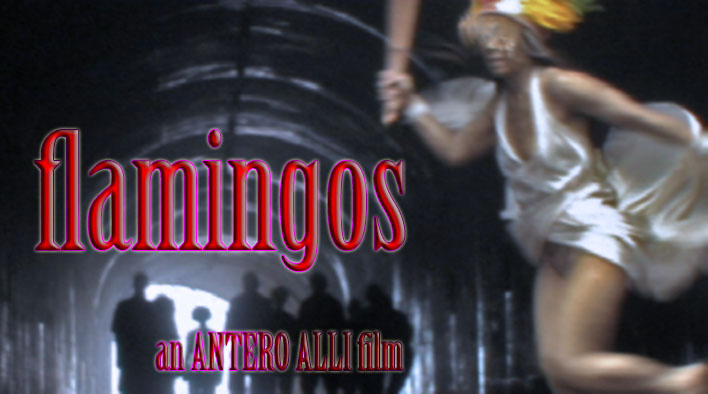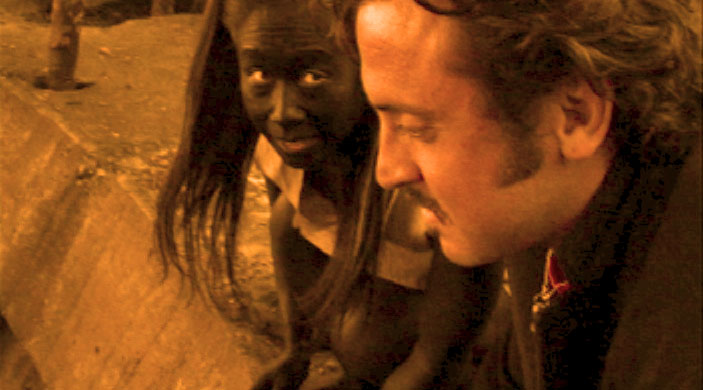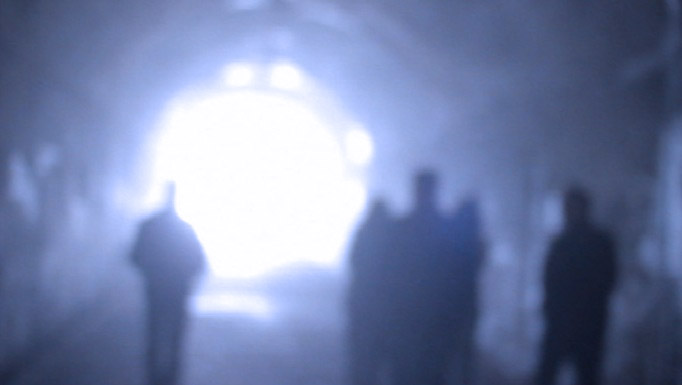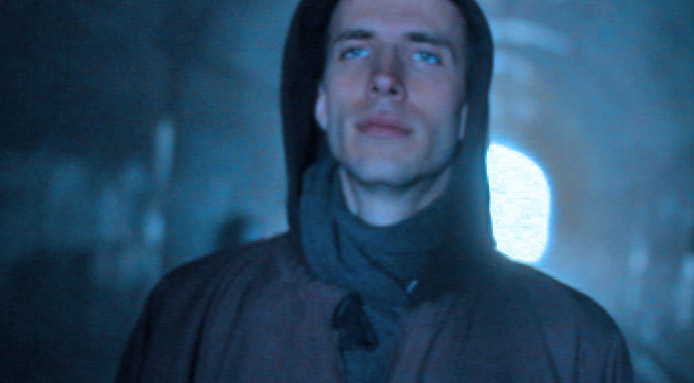Film Review by David Finkelstein
for filmthreat.com (4 stars out of 5)
FLAMINGOS (2012; 90 min. USA)
“Flamingos,” the terrific recent feature by Antero Alli, uses the claustrophobic situation of a bank robber holed up in a motel room with his girlfriend to create a kind of intense chamber drama in which the utopian dreams of two highly irrational people crash into each other, and into the stubborn resistance of the real world.
Ray, in a strong portrayal by Joe Estlack, is a charismatic outlaw and morphine addict who robs banks by hypnotizing the tellers. He is hiding out with Zoe, who dreams of running away to an eco-utopian commune. You can see immediately how irrational these characters are, since the very first thing you see them doing is videotaping Zoe rolling around in money, evidence that could be used to convict them of a Federal crime. Most of the film takes place in the motel room, where it becomes clear that Zoe and Ray are attracted to each other because of their instinctual feeling that capitalist, industrial society is doomed, and their mutual need to get away and create a new life. But, as they talk, it becomes clear that their visions of a future together are incompatible. In a way, the situation is a highly exaggerated version of a common experience: two people are sucked into a powerful psycho-sexual passion for each other and believe they are meant to be together forever, but when they start to really talk to each other, they find that the other person is not what they imagined them to be. It’s a problem endemic to those who live by emotional instinct, but without really observing the people and the world around them. It’s life by self-hypnosis.
Zoe is the sister of Ray’s wife Beatrice, and Madeline H.D. Brown plays both sisters in a brilliant tour de force. The film occasionally breaks from the motel room to show Beatrice talking to a lawyer (Robert Hamm) about divorcing Ray, and these scenes provided a much needed change from the tension of the motel room, especially since the lawyer appears to be the only ordinary, non-crazy character in the film, and he gives the viewer someone to identify with. (The film’s three other characters may not be likable, but the lurid glare of their intensity is riveting.) The film’s third element is a series of wordless, otherworldly scenes shot in an abandoned tunnel and pool and tinted with dreamlike colors, in which a wild female spirit with black-blue skin (in an astonishing performance by Alaska Yamada) and a bible reading monk (Ilya Parizhsky) enact wordless scenes which, in an indirect and poetic way, represent the underlying spiritual drives that push Ray and Zoe in their drama.
Although the story is not realistic, there is a palpable, visceral reality to the performances which is gripping. The plot is exceedingly simple, with few events, but it functions as a kind of poetic mechanism, designed to get different primal realities going in the characters. The film doesn't hide the fact that one actress is playing two roles, but no one would confuse the worldly, coolly manipulative Beatrice with Zoe, the girl who believes only in love and utopia. The sisters are two sides of a coin, two ways of responding to the same crazy longing. They function in the film as a kind of refracted, broken up image of two aspects of a woman.
The beautifully filmed sequences with the two spirit characters seem on the surface extraneous, but they are actually crucial to the film, as they represent forces which drive the two main characters. The female spirit seems like Ray’s inner female, with her rebellious search for freedom, while the male spirit seems to represent Zoe’s desire to provide order, meaning, and guidance to others, as he consults the bible and guides a crowd of mysterious people through the tunnel. These scenes provide images of the dialectic which drives the film.
The contained, focused settings of the film have the intensity of a string quartet, where a small number of players use a great deal of compressed interaction to explore a theme in depth. The silent, spirit scenes put a poetic resonance behind the film, but “Flamingos” also provides compelling human drama at the same time as it maintains a humorous, detached stance towards that drama, and the kitschy, movie-world trappings favored by the characters. It’s a stance Antero Alli has perfected in many of his films.




